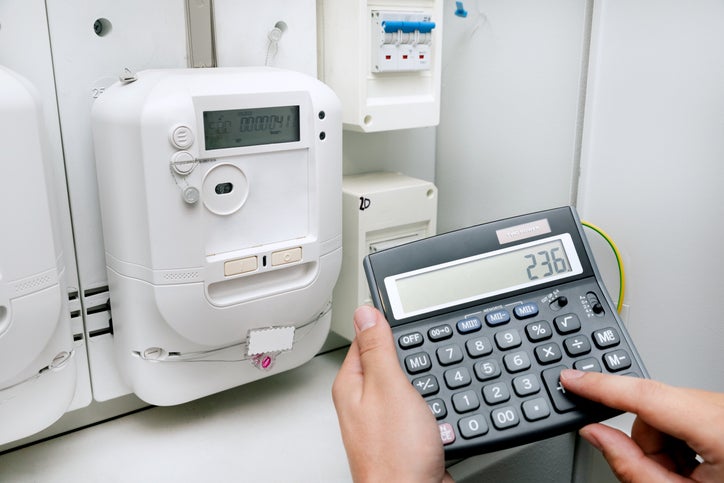* By submitting your details you agree to our terms and conditions and privacy policy . We promise we won’t share your data with others for marketing purposes.
Compare business energy prices

Compare, switch & renew energy with Bionic. Save up to £1,450

Could you save with a zero standing charge tariff from British Gas?

Bionic is the comparison site for your small business
Compare Energy Prices
By clicking 'Compare Energy Prices' you agree for us to search your current energy supplier and usage through industry held data. Enter manually

We compare from a panel of business energy suppliers
No long forms. Start a comparison with just your postcode. We use smart data to find energy info.
Compare quotes from a panel of energy suppliers. Including big names and specialist providers.
An energy expert will talk you through the quotes on screen and support you with the switch.
Why should you...
compare business energy quotes?
Switching to a fixed-rate energy contract helps to protect your business from market volatility, avoid more expensive out-of-contract rates, and cut the cost of your energy bills.
Comparing business energy quotes is the only way to make sure those fixed rates are among the best available.
When you run a business energy comparison with Bionic, we do all the hard work for you. Smart data helps cut the amount of form-filling, and we compare quotes from a panel of suppliers on one call - no need to ring around multiple suppliers to see what's on offer.
We recommend comparing quotes as soon as your switching window opens. Although this can be months before your current contract ends, locking in rates early can help avoid price volatility. It also means there's no chance of you rolling onto your supplier's out-of-contract rates. These are your supplier's default business energy tariff. They are variable and usually much more expensive than fixed-rate tariffs.
It's not always about price, though. When you compare business energy quotes with Bionic, we consider the needs of your business. If you want greater peace of mind in an unpredictable energy market, we can help you decide whether locking in a lower rate for a longer period makes more sense.
And we only work with a panel of trusted suppliers who offer reliable service and competitive rates. When you switch with Bionic, we support you with the switch and can automatically send you new quotes when it's time to renew.
Run a business energy comparison to see how much you could save
What business energy contracts are available?
When comparing new business energy deals, there are several different options available. We'll help you choose the one that's right for your business. There are also a couple you need to avoid - deemed rates and out-of-contract rates. These are suppliers' default variable tariffs and usually more expensive than fixed rate contracts.

Fixed rate contracts
Unit rates and standing charges are fixed for the length of your contract.

Variable rate
With a variable-rate contract, your unit rate and standing charge can change, depending on market conditions.

Time of use tariff
A time of use tariff charges less for energy usage during certain hours.

Blend and extend
Your supplier offers to extend your contract at rates between what you’re paying now and the current market rates.

Flex approach
You bulk-buy energy in advance, giving you access to wholesale rates. Usually best for high usage businesses.

Pass through
Your business energy bill is split between fixed wholesale rates, and other charges like National Grid and TNUoS.

Deemed rates
Your supplier's default rates if you don’t arrange a fixed contract before moving into new premises. Avoid.

Out-of-contract rates
Suppliers put you on out-of-contract rates if you don't sort a new contract to start when your current one ends. Avoid.
What type of business energy contract is best for your business?
When comparing new business energy deals, you may have several types of contracts to choose from. The energy experts at Bionic will talk you through the options to help make sure you get the right contract for your business.
Here are some of the tariff options that might be available to your business:
- Fixed-rate tariffs - Unit rates and standing charges are fixed for the length of your contract (usually between one and four years).
- Variable-rate tariffs - With a variable-rate contract, your unit rate and standing charge can change, depending on market conditions.
- Time-of-use tariffs - A time-of-use or “off-peak” tariff charges less for energy usage during certain hours, and you're rewarded with lower unit prices for using energy at times that put less demand on the grid.
- Blend and extend tariffs - With a blend and extend tariff, your supplier offers to extend your contract at rates between what you’re paying now and the current market rates.
- Flex approach tariffs - You bulk-buy energy in advance, usually when costs are low, giving you access to wholesale rates. Usually best for high usage businesses.
- Pass-through tariffs - Your business energy bill is split between fixed wholesale rates and other charges like National Grid and TNUoS. Most suited for businesses that don’t need price certainty.
- Deemed rates - Your supplier's default rates if you don’t arrange a fixed contract before moving into new premises. Avoid.
- Out-of-contract rates - Suppliers put you on out-of-contract rates if you don't sort a new contract to start when your current one ends. Avoid.
Is a lower unit rate or a lower standing charge best?
When comparing business energy prices, it’s essential to understand how suppliers charge for your electricity or gas usage. The two key components that make up your total bill and the unit rate and the standing charge.
Unit rate
The unit rate is the price you pay for each kilowatt (kWh) of energy your business uses. The more energy you use, the higher this portion of your bill will be. Unit rates can vary depending on factors such as business size, contract type, location, and energy usage.
If you use a lot of energy per month, you could substantially save money by going for the lowest unit cost available to you.
Standing charge
The standing charge is a fixed daily fee that covers the cost of supplying energy to your business premises. Unlike the unit rate, it stays the same regardless of how much energy you use. Standing charges can vary depending on your tariff and supplier.
If you don't use a lot of energy units (kWh), you could benefit financially by choosing a lower standing charge.
Compare business energy quotes
By clicking 'Compare business energy quotes' you agree for us to search your current energy supplier and usage through industry held data. Enter manually
Why get expert help from Bionic for business energy comparison?
If you’re thinking, “Why Bionic?” for business energy comparison, consider that we’ve already helped thousands of businesses in the UK compare business energy, and we can definitely do the same for your business.
Once we’ve gathered information about your business, its energy use, and its current supplier, our tech-enabled energy experts can compare deals from our panel of energy suppliers and support you through the switch. Our commercial energy comparison service removes the hassle of finding a cheaper business energy tariff, and can help you save time and money.
We also help commercial customers from the UK's main price comparison websites compare business energy prices - including Compare the Market, MoneySuperMarket, Uswitch, and Confused.com.
Find out why business energy is different, with our business energy coach
How much should your business pay for energy in 2026?
Our business gas and business electricity pages have the latest energy rates and standing charges in 2026. Below are some things to consider when comparing business energy rates.
- When you compare business energy rates, it's unlikely that the rates you're quoted will be cheaper than the rates you're currently paying. This is because, as with the price of most things, energy prices tend to increase steadily over time. If you renew after a long-term fixed deal, rates may have risen considerably since you last took out a new contract.
- Even though energy prices have been coming down since they spiked in 2022, and the market has become less volatile, rates are still higher than at any time since about September 2021.
- At Bionic, we aim to find the best possible rates for your next energy contract compared to what you might pay elsewhere or against your current supplier’s out-of-contract rates. Unlike domestic energy contracts, there are no off-the-shelf tariffs. This means your quote will be tailored to the needs of your business, and the price you pay will be determined by the size of your business, how and when it uses energy, and its location, among other things.
Or speak to one of our tech-enabled energy experts on 0800 860 6833
How much is the average 2026 business energy bill?
The amount you pay for your energy will depend on your contract type, how and when you use energy, and the energy efficiency of your workplace. The size and location of your business will also play a part.
But, to give you a rough idea of how much you should be paying, check out the following estimates:
| Business size | Annual gas usage | Estimated gas bill | Annual electric usage | Estimated electricity bill | Can you cut your bills? |
| Micro Business | 10,000 kWh | £869 | 10,000 kWh | £2,791 | Compare Quotes Now |
| Small Business | 22,500 kWh | £1,652 | 20,000 kWh | £5,433 | Compare Quotes Now |
| Medium Business | 47,500 kWh | £3,318 | 40,000 kWh | £10,834 | Compare Quotes Now |
| Large Business | 65,000 kWh | £4,772 | 55,000 kWh | £14,267 | Compare Quotes Now |
To learn more about business energy bills, check out our guide to understanding business energy bills. To compare the latest rates and standing charges, go to our business gas and business electricity pages.
Note: Prices are correct as of February 2026. Rates and bill size may vary according to your meter type and business location. The prices you’re quoted may be different from the averages shown. The figures shown are the average unit rates and standing charges quoted by Bionic per business size from January 1 to February 9, 2026.
Who is the cheapest business energy supplier?
Energy rates are constantly changing, largely due to the way the market operates and how energy is bought and sold.
Business energy contracts are designed to meet the specific needs of each business, and different suppliers offer varying rates, making it difficult to determine which is the most cost-effective.
The only way to find out who offers the cheapest business energy rates for your business is to run a price comparison. We monitor prices from our panel of suppliers to find you our best rates. Below is a breakdown of our suppliers' current rates.
| Supplier name | Gas unit rate (kWh) | Gas standing charge (daily) | Electricity unit rate (kWh) | Electricity standing charge (daily) | Ready to switch? |
| British Gas | 7.3p | 57.3p | 28.1p | 47.1p | Compare today's prices |
| BG Lite | 7.4p | 45.9p | 27.7p | 54.1p | Compare today's prices |
| EDF Energy | 6.8p | 48.5p | 26.3p | 54.6p | Compare today's prices |
| EON Next | 6.4p | 30.0p | 27.4p | 34.7p | Compare today's prices |
| ScottishPower | 6.3p | 30.8p | 23.1p | 70.9p | Compare today's prices |
| Smartest Energy | 5.0p | 99.5p | 24.4p | 69.0p | Compare today's prices |
| Valda Energy | 6.6p | 41.6p | 24.2p | 88.2p | Compare today's prices |
| Yorkshire Gas and Power | 5.4p | 54.9p | 24.3p | 70.0p | |
| Yu Energy | 6.8p | 37.3p | 22.9p | 105.9p | Compare today's prices |
Note: Prices are correct as of February 2026. Rates and bill size may vary according to your meter type and business location. The prices you’re quoted may be different from the averages shown. The figures shown are the average unit rates and standing charges quoted by Bionic per business size from January 1 to February 9, 2026.
We can also compare rates from other suppliers not listed above, including Crown Gas & Power, SSE, TotalEnergies, Corona, Engie, npower Business Solutions, and more.
When choosing an energy supplier, price isn’t the only thing you should consider. You need a contract that best suits your business needs. We compare quotes from a panel of energy suppliers to find a contract that works for your business. Let us know if you’d prefer to switch to any specific suppliers on the list.
What affects business energy prices?
It might feel like energy prices are always rising, but they actually fluctuate, which can make the timing of your switch all the more important. There are a number of reasons why prices go up and down:
- An increase in demand - Energy prices dropped to record lows during the first lockdown of 2020, as industrial energy demand plummeted. But as things have gotten back to normal and the demand for power increases, the prices have gone up.
- Global events - Oil prices are influenced by global events as well as supply and demand. If there are conflicts, political uncertainty, or natural disasters in a country that produces oil or gas, this will limit production and accessibility, pushing up prices. For example, in 2019, a political crisis and U.S. sanctions on Venezuela caused a spike in oil prices that pushed up global energy prices.
- The strength of the pound - As with any commodity, fluctuations in currency value can affect the cost of energy. As the UK imports a lot of its energy from Europe, the strength of the pound against the euro plays a part in costs. If the pound is strong against the euro, then prices should fall as energy is cheaper. If the pound is weak against the euro, prices are likely to rise.
- The weather - A cold winter can increase energy demand. This usually means prices go up. As we use more renewable energy sources, a drop in wind could means more natural gas is diverted to power stations. This can also push prices up. leading to increased prices.
- The price cap - Introduced to end 'rip-off' energy prices, the price cap has given suppliers a baseline they can use for their energy prices. Although the price cap only directly affects domestic energy customers, when the energy price cap increases, it can signal price rises across the board.
- Distribution and transport costs - these include green taxes like the Climate Change Levy (CCL) payments and VAT costs which make up other costs you pay for aside from wholesale energy.
How are business and domestic energy different?
There are several ways that business energy contracts differ from domestic energy deals, including:
- There are no 'off-the-shelf' business energy tariffs. All contracts are bespoke and designed to meet the needs of the individual business
- Business energy contracts are fixed-term with no option to terminate early. Unlike domestic energy deals, there's no cooling-off period with business energy. It's important to make sure you know the terms of your contract before you sign.
- New business energy contracts can be signed up to ten months before the current contract's end date, but the new contract won't start until the current one has ended. Domestic energy users can switch to another contract at any time. They might be hit with an early exit fee unless their contract has entered its final 49 days.
- Businesses can get gas and electricity from the same supplier but there is no dual fuel option.
- Business energy rates and standing charges aren't capped. Domestic rates and standing charges have a price cap, which is the maximum suppliers can charge.
The rules are slightly different if you work or run your business from home or if you're classed as a micro business. To find out more, check out our guide micro business energy.
Click to compare today's rates or speak to one of our tech-enabled energy experts on 0800 860 6833
How Digital Renewals can save you time and money
Switching business energy with Bionic means there’s no need to worry about renewals. When it’s time to renew, we’ll automatically compare quotes and line up your next contract – this could save you up to £1,450* a year on your previous contract!
Still not sure? Here are three reasons why Digital Renewals can benefit your business:
- Never roll onto your supplier’s out-of-contract rates - We line up your next contract early to make sure there’s no expensive gap between contracts
- Access to exclusive rates negotiated by Bionic - We use collective buying power to negotiate exclusive rates from our panel of suppliers
- Save time and money on renewals – We automatically compare quotes and email you the results. More than 60% of Digital Renewal customers save an average of £500 per year**
At Bionic, we manage more business energy renewals on behalf of customers than anyone else in the market. We expect to save Digital renewal customers over £10million*** this year!
For more information, check out Everything you need to know about Digital Renewals.
* Based on Digital Renewal customers being renewed in January 2025. Across 3,600 customers, 2,000 with a saving. 20% of customers with a saving of over £1,450 per year.
** Based on Digital Renewal customers being renewed in January 2025. Across 3,600 customers, 2,000 with a saving. Spend based on latest consumption readings, with changes only in rates themselves
*** Based on the average annual saving for Digital renewal customers in January 2025. Multiplied out across a full year of Digital renewals, assuming no change in market movement.
How Bionic business energy comparison works
Compare business energy quotes in three simple steps
1
Start your quote online
Start a business energy comparison with just your postcode
2
We do the comparison
We compare quotes from our panel of business energy suppliers
3
You choose your new supplier
You choose the supplier and rates you like best
What info do I need to compare business energy?
We can start your business energy comparison with just your postcode. And we use smart data to help cut the amount of form-filling. But it could help if you have the following info to hand.

The name of your current supplier and your account number

The address of your business

Your monthly or annual business energy usage

Recent meter readings
Business Energy FAQs
To help you understand more about comparing business energy and switching suppliers, here are the answers to some of our most frequently asked questions.
Our team shares essential knowledge on business energy

Is there an energy price cap for business?
There is no price cap on business energy. Instead, government support for businesses is given by way of a discount on energy unit rates. Here’s all you need to know.

Is commercial energy different to household energy?
Although it comes from the same sources – and possibly the same supplier – business energy is different to household energy. Here’s all you need to know.

How does being a micro business affect your energy contract?
Being a micro business affects the terms of your business energy contract. But what is a microbusiness? And does being one get you a better energy deal?

Why are energy prices so high? Are they still going up?
What is going on with energy prices in the UK? There's an energy crisis across the globe, with a number of major issues causing price volatility. Here's all you need to know.
Not your usual boring business content!

Sign-up to The Backbone, our free fortnightly newsletter for anyone who owns, runs, or works in one of the millions of businesses across the UK. Get the inside track from real business owners just like you




